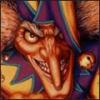I can't force myself to have ideas - I can only put enough inspiration infront of my mind that ideas are easier to form. I don't mean that creativity is some magical ability only Level 52 Arcane Game Designers have - what I mean is ideas are byproducts of consumption and relaxation. Consume books, movies, music - have conversations about baking or house construction, play with legos. Relax your mind from trying to come up with ideas, by occupying your mind with some menial task you don't have to think consciously about - taking a shower, going for a walk, or something else that doesn't require your mind to be focused on it.
This gives you pieces of ideas. No game, story, movie, pops fully formed into someone's head. It starts off as ideas that are built up, fall apart, reassembled, and sanded back down. You might get some ideas now that you won't use for years but that might suddenly pop into your head when you need them.
I'm sure you probably have tiny pieces of ideas that aren't fully formed. Pick one, and start building off that idea. That core 'seed' idea might not even make it into the final product - but it serves a purpose of being a makeshift platform you can build ideas on - and you build temporary scaffolding on it, then you start to see how it might fit together as a more cohesive whole, and you start to see what parts of the ideas don't actually fit that idea of a cohesive whole you thought of, and you start to have better ideas that do fit the cohesive whole now that you see empty holes that can be filled in.
Ideas don't have to be gameplay gimmicks that many indie games are centered around. They can be characters, or worlds, or items, or whatever. You have pieces of ideas - grab one, and build on it, and as you work, your mess of a temporary structure can continually change as you get ideas and refine the cohesive whole.
Example thought process:
[spoiler]A sword with an eye on it.
Why is there an eye on it? (asking yourself questions help flush out ideas - but when you get used to thinking like this, your mind skips the explicit questioning and the ideas still flow fine)
The eye is observing the world around it.
Why is it observing?
It's checking to make sure the area is safe, as well as to get it's bearing geographically.
What for?
So it can talk and communicate with the wielder (the player, probably) without any bystanders hearing, so it can tell the player where they need to go next.
The player didn't make the sword, and actually isn't even a good sword wielder - perhaps he's an archer. Maybe he's a hunter from his village - or was conscripted into the army as an archer.
The sword was actually a human who got somehow turned into a sword - perhaps he was the king of the land. Nope, too cliched. Perhaps he was the advisor to the king, and the king got angry at him, and had his court magicians turn him into a sword for the king to hang on the wall. The sword, being able to talk and see, found opportunity to gradually convince a servant boy to steal the sword and told the boy to take it to someone he could trust... (pause, thinking who that might be - it can't be any court officials, because the court officials won't go against the king, and infact probably were the ones who incited the king against him out of jealousy of his high position of favor and power) ...he has the servant boy carry him to a wealthy merchant he knows, who lives in that city and owns several warehouses and caravans. The merchant quickly sets out with a caravan full of trade goods, and several of his usual hired mercenaries (protection from bandits on the highways), of which the player, an ex-army archer, is one of those mercenaries.
The king, finding the sword stolen, sends some soldiers after the sword. They find the boy (who was spotted fleeing from the castle via a side entrance carrying a weird bundle), find out from the boy what house he took the sword to, cut off the boy's hands, find out the merchant left in a caravan, catch up to the caravan and attack it. The player and the under mercenaries fight back, since bandits also sometimes dress up as soldiers to "arrest" a merchant "on order of the king" before robbing caravans, since the caravan is already way out of the city. Since the guards were originally only chasing after the sword and the boy, there are only five or so guards attacking the caravan, and only three or four mercenaries apart from the player.
After killing most the guards, and almost everyone else getting killed in the process, the player, being an archer who stood farther back from the actual melee, is the only survivor, except perhaps a wounded guard who's half dead but who the player doesn't want to kill - the player maybe even gets him a drink of wine from a wineskin, and props him up against a rock. As the player is looking around, seeing who else is injured, he hears someone calling out... a man's voice, but it seems to be coming from a weird misshapen bundle in the caravan. This begins the journey of the player and the sword - after talking with the sword, the sword convinces him to flee, and he takes the sword, his bow, one of the several horses from the caravan (the guards' horses are exhausted from running to catch the caravan), and any easily-carryable gold or objects of value from the merchant's corpse and from the caravan, and flees for the large city the sword tells the player - and before that, the merchant - to head to.
Unfortunately, the bleeding guard lives through the next few hours until the next group of travellers comes by, makes it back to the castle, and informs the chief of guards what happened, giving an accurate description of "the sword-thief's" appearance. Hey, that'd make a good title for the game: 'The Swordthief'. Did someone already use that? *googles it* Dang it!
This doesn't necessarily mean that the king is evil. Or that the sword is good. The sword is obviously acting out of self-preservation, but perhaps there is a genuine reason that the king had him turned into a sword. (I'm picturing a more Arabian Night's style setting)
Perhaps neither the sword nor the king is good or evil, and perhaps as the player travels with the sword, there is more and more conflict between the player not fully aligning with the sword - who's done nothing really for him except get him hunted by the king's men. And perhaps the sword isn't trying to become king, but was being punished because he refused to give the king important information he had just obtained - some source of jinn-like power (again, Arabian Nights). The grand-advisor-turned-sword wanted the power for himself, and the king wants it for himself, so the sword is trying to lead the player to the power while at the same time trying to take precautions to prevent the player from taking the power for himself (and keeping the player as ignorant about the power as possible). Trying to take precautions against the player is hard, when the player is the one carrying him around and is always present, and the sword can't trust anyone - not the player, not the king, not the people he's trying to use against the king, and not the people he's trying to use as precautions against the player.
That's why the sword retained the ability to speak (apparently) and wasn't just killed - the king questioned him frequently, seeing if he was willing to finally part with the information.
Dialogue-heavy fully voice-acted interactions between the sword and the player, a la Portal 2 dialogue between the Player and Wheatley and the Player and Glados, except less comedic from stupidity or absurdity and more comedic from sharp wit and verbal sparring between the sword and player, like found in some good period dramas (Pride and Prejudice comes to mind - Elizabeth vs Mr Darcy, shots fired both ways, or Elizabeth + father taking shots at the (ignorant) Mr Collins; Emma (also Jane Austen) also has great wit flying between Emma and Mr Knightly).
[/spoiler]
See how, by taking tiny 'seed' ideas - some of which might later be discarded as the idea continues to take shape. It makes sense that the sword can speak, but really, why does it need an eye to see? The eye might get axed. And why a sword? Why not an amulet? Why an amulet?
By taking 'seed' ideas, and just building almost without direction, you then later get your bearing as ideas start flowing more freely, and then can hack the cluster of ideas back into shape, adding, removing, and refining.
Further, when stuck, ask questions. Why a sword? How did a servant boy even get near the object? Surely the king would've locked the object someplace where the object wouldn't tell the information to someone who isn't the king. But now we have such a structure of ideas already in existence, we can build in many directions. We can handwave away the servant boy, make an arbitrary choice of what kind of object the grand advisor was turned into (a parrot? an amulet? a ring the king kept on his finger but that slipped itself off (rather The Hobbit-like) unnoticed?). Now, that the ideas have started to flow, we have alot more to work with.
1) Take seed ideas, build off them, discard the original seeds later if needed. This helps with the flow of ideas.
2) When stuck, ask questions. Who, What, When, Where, and How? This helps with the flow of ideas.
3) Be inspired by existing works. I unintentionally was inspired by Arabian Nights + Aladdin for the world, Jane Austen and Portal 2 for the character interaction, potentially The Hobbit, and who knows how much other things. Choices I make are partially inspired by what I've already consumed, and further, the choices I intentionally avoid making (No, the sword isn't the king trying to get his throne back, too cliched) are also inspired by what I've consumed.
Consume, question, and create. And relax. Don't force it.













